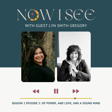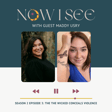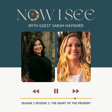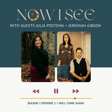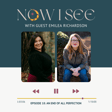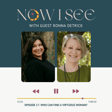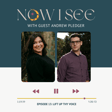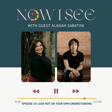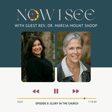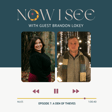Become a Creator today!Start creating today - Share your story with the world!
Start for free
00:00:00
00:00:01

Healing to the Bones: Understanding and Recovering from Religious Trauma with Dr. Chacy Agnello
Therapy isn’t usually something you hear about in strict religious circles. Medication is often put down and things like depression, anxiety, and mental illness are attributed to a sin nature or a lackluster trust in God. Many folks who leave these religions have little knowledge of what therapy is and how it can help them understand what they’re going through.
In this episode, I’m joined by Dr. Chacy Agnello, founder of Free Bird Psychological Services. Dr. Agnello shares her experience working with patients that come from extremist backgrounds. She also shares a wealth of knowledge and leaves us with advice on how to begin (or continue) the post-faithfulness journey.
Resources
- Read Leaving the Fold by Dr. Marlene Winell
- Read The Body Keeps the Score by Bessel Van Der Kolk
- Read Educated by Tara Westover
- Read Unfollow by Megan Phelps-Roper
- Get on Dr. Agnello’s Waitlist (SC residents & women only)
Links
Transcript
Introduction to 'Now I See' Podcast
00:00:01
Speaker
I was lost in utter darkness I was trapped in toxic shame I was bound by my religion Till I chose to break away
00:00:24
Speaker
Now I'm finding my true colors For the first time I feel free Now I'm learning self compassion And as I heal I'm finding peace
00:00:51
Speaker
Welcome to Now I See, eye-opening stories from the formerly faithful.
Exploring Rigid Faith Systems with Dr. Chacey Ignello
00:00:56
Speaker
I'm your host, Amber White, and here, me and my guests share our experiences in loving and leaving rigid faith systems. Together, we shine a light on the dark corners of these institutions and share the joys of rebuilding life on our own terms. I promise you'll leave inspired, even if you are a little teary-eyed.
00:01:23
Speaker
Hi, and welcome back to Now I See. I'm your host, Amber White, and today I am switching things up on you a bit and talking with an expert. Dr. Chacey Ignello is a trauma therapist developing a subspecialty in religious trauma. She's based here in South Carolina.
00:01:43
Speaker
And when she moved here, she was surprised to find that there were so many folks in this area struggling through the aftermath of leaving Christianity. I'll let her tell you more about that later on.
Amber's Therapeutic Journey and Podcast Inspiration
00:01:55
Speaker
If you've listened to any of my other episodes, you'll know that I'm a huge proponent of therapy.
00:02:01
Speaker
When I was in college at UNC Asheville, I found out there was a free counseling center on campus, and thanks to some encouragement from loved ones, I made an appointment with one of the therapists there. I will never forget her as long as I live. It was relieving to have someone tell me that what I was feeling and thinking wasn't crazy.
00:02:25
Speaker
and she encouraged me through so many tough and confusing times in those first few years after leaving. And my current therapist has been immensely helpful in getting me through the idea phase of this podcast and through the current, sometimes challenging, aftermath.
Understanding Therapy's Role in Healing
00:02:44
Speaker
I think there's this assumption about therapy that you're going to be sprawled out across some chaise lounge bawling your eyes out to a stranger who only knows how to ask and how does that make you feel?
00:02:58
Speaker
But the reality is that therapy is much more casual than that. And it's an opportunity to talk with someone in confidentiality that's outside of your situation and is trained to help you work through the things that are holding you back or bringing you down. In my experience, more often than not, they can provide clarity to a situation that feels like a jumbled up mess in your brain.
00:03:26
Speaker
I've also found that it's really, really nice to have someone help me pump the brakes on my terrible tendency to spiral. Being reminded that the thought patterns I've become very used to over the years aren't helping me and are actually holding me back is a gift.
00:03:47
Speaker
a gift that also comes with a mirror that makes you take a hard look at yourself. And I got to tell you, that part kind of sucks sometimes, but I'm still really grateful for it because there's something powerful about witnessing all the parts of yourself, the good and the bad, and making choices from that informed place. I highly recommend it.
00:04:13
Speaker
For those of us who've left our religion and often our families as a result, there is a lot to unpack and process. For those of us who also experienced various other forms of abuse, there's even more. I'm still in the learning process, but I can promise you this much. Going through it alone feels like shit.
Choosing the Right Therapist
00:04:38
Speaker
Going through it with a therapist and a small group of folks who love you is where the magic is. If you need help finding a therapist, Dr. Ignello gives some pointers in this episode. I recommend digging into a therapist as much as you can before you meet them.
00:04:55
Speaker
It's perfectly normal to have a call and see if you're a good fit, and it's also perfectly normal to decide someone isn't the best fit for you and your situation and try again. You didn't learn this in church, so I'm here to tell you. You can trust your gut on this one.
00:05:12
Speaker
This episode is also packed full of incredible information that can help get you started. As always, there is a link in the bio with resources for you and a link to the bookshop that is filled with books organized into helpful categories that may be useful to you on your journey.
00:05:31
Speaker
or if you're just curious and want to learn more about the subjects and read some amazing stories.
Dr. Ignello's Specialization in Religious Trauma
00:05:37
Speaker
Okay, now that I've hopefully convinced you to go to therapy, let's get into the episode.
00:05:53
Speaker
Hi, Dr. Ignello. Thank you for being on the podcast today. I am so excited to have you. I didn't even know there was such a thing as a specialist or therapists who specialize in religious trauma and you're developing that subspecialty. So tell me a little bit about your background with that and how you came to developing that.
00:06:15
Speaker
Yeah, I was not planning on developing it. It kind of developed me. I'm originally from California, and I went to grad school in Florida, and it was there that I did notice a little bit of difference in the way that people were approaching religion. Fairly secular for me out there in California, but once we got out here in the South,
00:06:39
Speaker
The school was teaching very, very positive things about religion, which really hadn't been my experience. And then when I moved up here and started my practice, I see women who deal with developmental trauma, which is trauma that occurs during developmental stages, important developmental stages like psychosocial development, trust versus mistrust, autonomy versus shame and doubt, those kinds of things. So I started getting a lot of people
00:07:09
Speaker
feeling me out to see what I thought about religion on the phone. I wasn't sure what they were asking me at first. I thought they were looking for a Christian counselor, but they were actually not looking for a Christian counselor.
Challenges and Demand for Secular Counseling
00:07:23
Speaker
They really wanted somebody secular. So I would say, yeah, come on in. And we would work on the childhood trauma stuff, but what was happening was I was getting a lot of people in who
00:07:34
Speaker
were telling me they were essentially raised in cults and they were homeschooled and they were terrified of leaving the religion because they thought maybe they had all these lingering feelings about like maybe they really were going to burn in hell and their families were giving them a very hard time about it. And so I would treat the family problems, but there was still this underlying
00:08:00
Speaker
thing that I couldn't quite get to. And so I started just reading more about it and asking my clients who come from those sort of backgrounds, like, what should I read? What do you think? And so I've kind of just fell into this subspecialty that I'm just developing. I wouldn't call myself an expert in it, but I would say I'm gaining expertise of people who are sort of deconstructing or are in the process of leaving.
00:08:29
Speaker
their religion or questioning their religious beliefs who've grown up in the South and are having a hard time, are having a hard time
Impact of Religious Trauma on Development
00:08:36
Speaker
finding someone. There really aren't. I do think there's another therapist in the area, but there's not a lot for the amount of people that I see. I would say probably
00:08:47
Speaker
60 to 70% of my clients would have some kind of religious trauma and maybe like 40 to 50% would have it as like a primary issue. 40 to 50%, that's really high numbers.
00:09:02
Speaker
Yeah. Wow. It's amazing to me here that there's only two people who really have any sort of specialty in the field in this town because there's 500,000 people here and it's the home of Bob Jones University. I think that's the problem.
00:09:19
Speaker
I do get a lot of people who have been taken to Christian counselors as kids or have seen them because their doctors have referred them to Christian counselors and they're looking not for that.
00:09:36
Speaker
And what I would like to say is that even though there's not a lot of people around here, you always have the right to ask a therapist to stop talking to you about religion and to respect your beliefs. So, you know, if they're telling you to pray on it or giving you biblical scripture, you can always say, like, that's really not what I want out of a therapy session. That's really good advice. I wouldn't have even thought, hey, don't tell me that.
00:10:05
Speaker
That's great. Yeah. My daughter-in-law went to a secular, supposedly secular counselor and she wound up leaving because she kept getting told to like pray or the God watching her. And she's like, that's not my beliefs, but she didn't speak up. That's so wild. Yeah. I can't imagine going to a secular therapist and hearing that at all.
00:10:25
Speaker
That was in California, too. That was in California? Yeah. I thought that would have been here. No, but what happened was people would call me up and be like, kind of like, how did you vote? Or like, I saw you have a tattoo or you seem like you're not from here.
00:10:41
Speaker
And so finally, I just recently put on there, I am a secular counselor. I think one of the big clues was there's little boxes you could click on like psychology today that say that you'll treat LGBT clients. And I think that was one of the ways people were finding me. Like if I would do that, then I probably wasn't a Christian counselor.
00:11:03
Speaker
So people are very resourceful in the ways they had found me. That's great though. I'm glad that that's an option with Psychology Today. You know, I was actually looking over the guest list for this podcast and half of the participants are in the LGBTQ plus community, which is not surprising in some ways, right? Like all the people who are going to be pushed out of the church, they're probably top of the list there. There are real impetus to leave when you're not being accepted. When you're very self is disdained. Yeah.
00:11:32
Speaker
With 50% of your clients experiencing this, was that shocking to you at first? Yes, very shocking. I went back to grad school late, so I've only been out a few years. I started when I was 44 and I'm 52. I did not think that psychology and religion
00:11:56
Speaker
went together all that well. But we were very much told differently and a lot of my professors were, you know, wearing outward symbols of Christianity like crosses around their necks and things like that and very pro-religion and pulling up the pro-religion studies and I was kind of like, where's the, not pro-religion because there are some really big differences I think between
00:12:24
Speaker
psychology and religion, and a couple of those would be, is that, you know, like you have to forgive. And I do treat trauma. I have lots of clients, you know, I have clients who have brothers or fathers, family members have raped them, right? I don't tell them they have to forgive.
00:12:42
Speaker
to move on. They can just, you know, we can process it, shift our energy. They don't have to forgive. If people want to forgive, that's none of my business, but that's not what I'm, I'm there to do. Another really big difference between most religions, even like Buddhism, um, and psychology is, is like your feelings, like your thoughts and your feelings. Like even Buddhism is like, you know, anger is not a good emotion. It's like, well, all emotions are there for a reason. Yeah.
00:13:10
Speaker
or your thoughts. I grew up quasi-Catholic at times, and it was in thought as it is indeed. Basically, if you think it, you've done it. And that is, we know, if I tell you to think about a pink elephant, you're going to think about a pink elephant. And the big part of psychology is teaching people your thoughts. You don't have to latch onto them. They don't define you. You can have all kinds of thoughts.
00:13:34
Speaker
I love hearing you say all of that because anyone listening will know that we've had some guests on the show who didn't experience that. Their father, brothers, were involved in abusing them in many ways and were told by not only the pastors of the church, but the Christian counselors they were taken to that it was their responsibility to forgive. Meanwhile, the father's not actually asking for forgiveness. He's not even apologizing.
00:14:01
Speaker
Yeah, forgiveness is a funny thing because if you look it up, you'll get a lot of different definitions, but one of them is sort of like, you know, bestowing, like, forgiveness on somebody who's asking, you know, and a lot of these people, like you said, aren't asking. And some people aren't able to forgive or don't want to forgive. I think some things are unforgivable.
00:14:21
Speaker
Yeah, that's my belief. Yeah. And so, you know, somebody wants to forgive. That's just not my business. That's not what I'm there to
Navigating Family Relationships After Leaving Religion
00:14:29
Speaker
do. I'm there to help people see what has happened to them and how it has affected them and get them to move through it and on to kind of more of the life they want and where to shift their energy and
00:14:40
Speaker
where to put their attention so that it pays off. But as far as, you know, I always use this analogy of like, if you go into the ER, they don't look, if you have a, you know, giant gash on your arm, they don't ask you, did the person who did this mean to do it?
00:14:57
Speaker
They don't ask you that. They're just going to treat the wound. That's what I do. It's like it doesn't matter to me if parents meant to do it, didn't mean to do it. If the effect is on you, I'm going to treat that. And most of the time by the end of treatment, my clients know whether or not they forgive and what they forgive and how much they forgive and how much contact they want and how much
00:15:20
Speaker
You know, yeah, they can take but that that's not that's not on me to do for them. Just kind of help them get where they want to go.
00:15:31
Speaker
Yeah, my job's clean out the wound and help them understand like, hey, you may not have full range of motion because of this thing, you know, like what's the damage done? And how do you work that arm now that we've like treated it? Because people frequently have come in like saying they forgive someone and they haven't really processed it. They just said, I should forgive, so I'm gonna forgive. And anytime we like lie to ourselves or shove something down,
00:15:59
Speaker
It comes back up in other ways. Every time. It does something to us. It's that repression. It kind of makes you numb or there's something gnawing at you where it's just not right. And so we kind of dig it back up and say, I don't know if you really did or not. Yeah.
00:16:16
Speaker
That's great. I know when I was first leaving and processing and just really taking a bird's eye view of my experiences, it didn't cross my mind for years that there was another option other than to forgive. Yeah, right. It's amazing to me, having come out of it, how limited you think your choices are because your choices have been so limited.
00:16:41
Speaker
a world of options doesn't present itself when you've only been presented with two options. And so I really love your approach in saying, look at all these options. Let's choose, let's let you try some on and choose which ones are going to work for you for your goals. That's really amazing. I love that take.
00:16:59
Speaker
So when you first started seeing patients and you started noticing this trend, what were some of the things that stood out to you about their experiences that might have been unique or surprising or traumatizing for you maybe?
00:17:14
Speaker
Well, I think at first, like I think back to this one client who was young and told me she stopped believing in God and I was like, okay. And I just thought, yeah, he went to school, you know, I'm sure he learned some stuff. And I did not respond to it. I don't think as I did not weigh it as heavily as I probably should. And I'm looking back now, what I know now, I would have handled it differently. But the sense of that,
00:17:44
Speaker
One of the things that has really surprised me is the lack of sense of self that people have that come from these strict religious upbringings, right? Because I think this person said something to me. I'm going to paraphrase here, but something like, I'm nothing. I'm nothing. I'm nothing without God. And I was like, what are you talking about?
00:18:01
Speaker
So I just didn't know. So I was like, what do you mean? And so, you know, the more I've learned, the more I realize like, yeah, everything that's good is through God. Everything that you do that's bad is through you. So if you don't believe anymore, you're just sort of left with all this bad stuff. They're just bad. Yeah. Yeah. You don't get to develop, you know, typically the way that a child should with building self-efficacy and all that sort of stuff.
00:18:28
Speaker
Yeah. The doctrine of original sin is where that comes from, right? So you're born into sin because your ancestors from ages and ages and ages ago that you've never really maybe even considered that much sinned. And so their fault is your fault and you're terrible. There's nothing you can do to stop being terrible other than give up all control over your sense of self.
00:18:51
Speaker
and live in line with God's will. But that term is so poorly defined. I can think back to, I mean, I went to Bible college. I grew up in this. I spent my entire life devoted to this. I could not give you a single definition for God's will.
00:19:08
Speaker
How do you know? You don't. How do you separate your thoughts from God's will? You don't. Confusing. It's super confusing. And you end up, it ends up being the will of whoever is in control of you. So whether that's your church or your parents or whatever authority figures you have, that's what God's will ends up being. Yeah. And
00:19:32
Speaker
I'm on year 14, I think, of unpacking all of this. And I still sometimes see myself not taking a full sense of self approach. Right. Trying to pull in somebody else's opinion into a decision or somebody else's opinion on my performance rather than mine. It takes a long time. Yeah. It's because the developmental milestones that you're supposed to meet,
00:19:59
Speaker
These rigid religious doctrines get in the
Religion's Impact on Gender Roles and Sexuality
00:20:02
Speaker
way, right? You're supposed to be developing as your parents are supposed to be a mirror for you and they're supposed to be a mirror with kind and gentle lighting, right? Like you look good in it and they kind of guide you and like the things you're not so good at they go like
00:20:16
Speaker
maybe that's a place to work on or whatever, but you're supposed to know what you're good at and what qualities you have that you are special in that way that you bring into the world. And strict religion like that says you are not special. The only thing that makes you special is God makes you special, but you don't have any special talents. And if you have something, it's not yours.
00:20:37
Speaker
It was given to you. Can you see how that would interfere with your sense of like self? It's building self-efficacy. So if you take that away, then you're left. Those developmental milestones like trust versus mistrust. Like I said, you know, autonomy versus self-endoubt. If you don't do them right the first time, that's what therapy is. We go back. Do it again. We do it again.
00:20:59
Speaker
Wow. That's fascinating. I'm even thinking about like one of my biggest points of contention was always dress codes because I am
00:21:10
Speaker
Creative, I love to dress myself. I've always enjoyed that. My mom can tell you hilarious stories of me going through outfit after outfit after outfit. I didn't really get to choose what I wore though, right? Because I couldn't wear this type of top, I couldn't wear this type of skirt, couldn't wear pants to church, can't wear it. And so I'm thinking even the smallest parts of our lives are controlled.
00:21:33
Speaker
And so I remember leaving, leaving home and going to college. I was 21 years old and just being so entirely overwhelmed by all the choices in front of me. Nobody else was having this problem that I could tell, you know what I mean? If they were, we were both doing the same thing and pretending like we weren't. So it's amazing to me to hear you say that and then think, oh no wonder I was so fucking overwhelmed.
00:21:58
Speaker
because I had no idea what I was doing, and I had no idea who I was. You don't know yourself. You don't know yourself, but I mean, even like, you know, I worked for many years before I went back to school. I was an early interventionist, so I'm really familiar with, like, children's development. And we tell parents, as soon as the kid's able to point, you start offering two choices, two acceptable choices. Do you want this or do you want this?
00:22:22
Speaker
and gives them a sense of like, I have control in my life, right? So these high control religions really impact that autonomy piece, right? Like I can do things, I can choose, I have agency in my life.
00:22:40
Speaker
I love that. That actually leads in pretty perfectly to a question that I had for us, which is how intertwined are family trauma and religious trauma in your experience? Well, my clients, it's very, very intertwined. I definitely have clients who don't have religious trauma.
00:23:00
Speaker
But it really goes hand in hand because there's a lot of like misogyny and a lot of sort of like biblical ideas that are used on some of these kids and the people I see that are like homeschooled, right? Yeah. Homeschooled, like nobody's watching them.
00:23:23
Speaker
It's real scary for me when I get somebody who says they were homeschooled. I always wonder why, you know, it's like a lot of people homeschooling now, but what why I know and it's Sometimes it's because they don't want anybody watching what they're doing to the kids Interesting, you know, um, and the kids are doing a lot of housework. They're doing they're taking on teaching responsibilities Right for other kids. It's sort of you know, very when clients it's like a little house on the prairie like there was like
00:23:52
Speaker
I'm going to have like eight kids living in a trailer out here, you know, and they were homeschooled and it's like.
00:23:58
Speaker
you know, school would have been a place to see some other things. School would have been a place to get some other input, right? But if you have parents who are that high control, right, you can't get away, so they are the only voice you get. You don't get the teacher saying, hey, you're really good at music, or, you know, I mean, you're funny, or, you know, I like the way you did that. Like, you just, they're so isolated.
00:24:23
Speaker
So it tends to be the more, the more strict like that kind of goes along with some abuse. And I mean, and I'm talking about like psychological abuse too, where it's like, if you have a thought, you're going to burn in hell. Right. Right. I've had clients just scared that any thought they have is going to, you know, they're going to be burning forever. Right. Even though, even when they come along, they're like, I don't think I believe any of this anymore. There's still this little part that's in there. And I think that's probably the hardest thing.
00:24:53
Speaker
To get rid of how much like when there's just, you know, sort of developmental trauma. I think the hardest part is for people learn how to trust their own perspective. Because you've been told so many times your perspective's wrong, usually in those kind of houses.
Secularism vs. Religious Adherence and Mental Health
00:25:09
Speaker
And so that definitely also happens with the religious trauma.
00:25:12
Speaker
And the other thing is that sense of like, I'm bad, because most people who've just had trauma have internalized that sense that they're bad period. And I think that really does correlate to religious trauma. They sort of have this like, I'm not good enough. Yeah. It's interesting you said that in two pieces of scripture immediately came to mind for me. And one of them is the one that says, lean not on your own understanding.
00:25:34
Speaker
So right there in the text, it's like, oh, whatever you think can't possibly be good, so don't think. And then there's the one that says that the heart is desperately wicked and deceitful and no man can trust it, right?
00:25:48
Speaker
Those are very intense. So how do you function? How do you have a good and strong sense of self? And we're supposed to be egolists or whatever. Your ego is there to protect you. The stuff's all there for a reason.
00:26:06
Speaker
Right. Yeah. It's all supposed to work together. Yeah. Yeah. Not like push it down into the ether and then say, I wonder where, wonder why I'm so sad. I wonder why I don't feel competent or capable. And it's confusing because
00:26:21
Speaker
you know, kids are curious. And so a lot of kids will ask questions and then they get answers that don't make sense and they get told it's wrong to ask questions. So now you've like dampened the child's natural curiosity, you're dulling their critical thinking skills. You know, the clients I get in repeatedly ask me why they got out and their family members, like their siblings are still there. And I say, it's, I don't know exactly, but it's probably some combination of
00:26:49
Speaker
Critical thinking, discomfort with not sort of aligning with your truth. Some people can go like, well, whatever. It's like, I'll go along to get along. Those are my clients that come in because it takes a lot to get out. So it's somebody who like goes, I don't think I believe this and I can't lie and say I do because there's too much discomfort. It's a lot. It's terrifying. Yeah.
00:27:16
Speaker
you know, really terrifying. And the confusion point, I'm glad you brought that up because I think the two biggest things I felt in those first few years, especially after leaving were being terrified and being confused. I have no idea what's going on, but I'm really scared of it. And some of it's because of the confusion and some of it's because there is fear of being punished eternally to the very core of your soul.
00:27:41
Speaker
Yeah, I mean, a lot of people have like, you know, in this small community, people are watching you.
00:27:49
Speaker
Everybody is watching you. They're gonna tell. I've had probably, I've only been up here like two years. I've had probably maybe five or six people who the Colts, you know, kind of thing were like, their grand, started with a grandfather and then went down to the parents and then now the kids are doing it. And so it's just like, nobody gets in there. That's gonna cause a fuss. Nobody's gonna go like, hey, that does not seem right.
00:28:17
Speaker
it's sequestered and isolated for a reason. Yeah, there's a purpose for that, for sure. Right, so if you keep people away from learning about things or ideas or worldliness and that kind of thing, right, you aren't going to be afraid. Yeah. What's interesting to me about that is that it's such a lazy way of doing it, right? Because there is scripture that says, study to show thyself approved unto God, right? So the idea is then that you should be able to go and live
00:28:43
Speaker
in the world and be able to still have your faith and defend your faith because you know it so well. But what's interesting to me about the cult way of doing faith is that they just cut that part all together and say, well, if we just be a cult, we don't have to worry about that part. And we can throw out our indoctrination and it won't be questioned because nobody's going to go anywhere. And we're telling moms to stay home and kids to stay home and nobody ever leaves home or this church.
00:29:13
Speaker
It's very real. It's very, very, very common. One of the things that I try to remind people on almost every episode of this show so far is this is very common, especially in the South. We're talking colleges that have tens of thousands of students who grew up like this. And I think people think it's a smaller issue than it is when it's really massive.
00:29:38
Speaker
Yeah. And I think we're seeing that on a grander stage now, but it's still bigger than I think people realize. Yeah. I think, you know, with the internet and with the world, like Europe has been first and getting more secular. I think they're about 40% secular now. And it has not been as much in the United States, but people who identify as like not, not religious. It is growing.
00:30:08
Speaker
It's growing and so it's I think that. You know Marlene when l wrote a book called leaving the fold. And she's somebody that I'm reading a lot of but you know she she talks about just how there's like.
00:30:27
Speaker
just even regular, you know, religion, things that aren't like considered a cult, right? They're just forcing children to go to church hardly seems like a crime. Real damage is assumed to be done by extreme fringe groups we call cults and people who have heard of ritual abuse. Moreover, religious institutions have a vested interest in promoting an uncritical view, but mind control and emotional abuse is actually the norm for many large, authoritarian, mainline religious groups.
00:30:54
Speaker
The sanitization of religion makes it all the more insidious when the communities are so large and the practice is normalized, victims are silenced. It's so normal to go to church. Right? Yeah, you're abnormal if you don't go. Right. Especially her. Yeah, you're abnormal if you don't go. But I think some of the things that they're teaching are just
00:31:16
Speaker
make people mentally sick, right? And there's a lot of correlation between OCD and some religious sort of things.
Emotional Challenges of Leaving Religion
00:31:26
Speaker
I mean, you can see Catholics get on the rosary and count the beads. And it's very... We'll have people with OCD that do prayers and things like that.
00:31:41
Speaker
Like if somebody comes to me and they are religious and have no problem with it, it's not an issue. Right. If it works for them, that's fine. It's just, it, it's not working for a lot of my clients. Right. Yeah. Which is probably why they sought you out. I think so. Actually just starting to get people who are just coming before that.
00:32:02
Speaker
I wonder if it's the image of the bird leaving the cage that's getting people because that I can see that striking a chord. Yeah. Yeah. Yeah. That's my logo. My, my practice is called free bird psychological services. And I love that image because it's sort of like we all have the key, you know, it's, it's, there's a thing called learned helplessness.
00:32:24
Speaker
that we get. And they've done studies where they'll put dogs in cages and then they'll zap them when they come out. And then they'll stop zapping, but the dogs won't come out anymore. And the only way they can get the dogs out is to drag them out. And they call that learned helplessness. And if you're in a religious trauma context, but if you're like,
00:32:50
Speaker
this doesn't make sense to me. And you get an answer, you know, it's a circular answer, you have to believe or this is just faith or whatever that is, right? Or, you know, you're going to burn in hell or you're going to all these kinds of things. The cage door is open, but you don't feel like you can leave. Right. You know, and so my job is sort of be like, come on out. And sometimes I have to reach out and drag you up.
00:33:15
Speaker
Gently and verbally. Gently drag you out, yes. It's interesting you bring up the questioning because I was an extraordinarily curious child. Very curious, very playful, very imaginative. And so when I'm thinking about evangelism, which was a huge part of my church, I just couldn't quite figure out like, but what about the people who don't have access to a Bible?
00:33:39
Speaker
Like I knew enough to know that there were people out there who did not have Bibles who did not speak that language who For whatever reason were so remote that they weren't gonna ever Hear the gospel and so I remember asking like but what happens to them? Well, I
00:33:55
Speaker
It would either be like an, oh, I don't know, or, oh, God makes a pass for them. And I'm like, okay, well, who else does God make a pass for? Because to me, if we're talking about eternal damnation, there should be some pretty clear guidelines as to what does and does not qualify you for torture.
00:34:16
Speaker
Before I really even started doing this, if I had clients who want to talk about religion, I'd say, we can talk about religion. But I want you to be prepared for the fact that this may, it all may fall apart pretty quickly in the harsh lights in my office. Yeah. Yeah. Sometimes those things that
00:34:33
Speaker
are so you know you're indoctrinated with like when you really take them out of the box and look at them under the harsh fluorescent lights like they don't, they don't fit, they just don't fit. So I'm never trying to like rip somebody's coping skills away if they don't want them taken but that was always my warning like you'll be happy to discuss it with you but like be prepared for what you might find if you look carefully.
00:34:58
Speaker
Right. It's a good warning because when you really start looking, it gets kind of nasty. It really surprised me even when I did decide to leave and kept looking at just how horrible it is the more you look at it.
00:35:13
Speaker
And I'm glad that you prepare your clients for that because it is it's a process and it tears apart your foundation and your connection with your family and And what's interesting though is and I'm curious if this has been your experience with most of your clients My connection with my family was not entirely because of me Right. Like I had to remove myself because when I confronted them with hey, I'd like to go to another church I was met with no I
00:35:39
Speaker
but I was in, yes, this is happening mode, right? And so I leave and I would love to have continued to having a respectful relationship, but that wasn't gonna happen. And I'm curious if that, do most of your clients find that their families are always trying to drag them back in and that they have to make that break? Well, everybody's in different stages that I see, but that is a common theme of like, they all, it's very common for people to kind of,
00:36:08
Speaker
lie for a while, you know, about like, yeah, I'm going to church. Yeah, we went, you know what I mean? They don't give too many details, that kind of thing. But I do have like several people in that place right now where they're kind of like, I just, I can't, you know, and I'm like, okay, you know, do what you need to do. But I think it's a stage people go through where it's sort of like, you have to reconcile for yourself. Like if your family can,
00:36:36
Speaker
if you can handle what they may do, if you say, I don't believe, you know? So again, that's like, what are the consequences? There's a consequence. Everything we do has a potential consequence. And that is a big concern for most of those clients is like, what is grandma gonna say? My siblings won't talk to me. And everybody, just the real common theme is I'll have people in my office day after day,
00:37:01
Speaker
saying the exact same things but how they feel so isolated like nobody's going through this and I'm like there's lots of people going through it. I'm trying to bring those people together here. Hopefully we can support each other. Such a great idea because I know that there's lots of people going through this but it feels very isolating I think.
00:37:21
Speaker
Yeah, it can feel very isolating. I am thinking about being in college and people talking about the Simpsons and me going, I've never seen that. Like, I've never seen that. What are you talking about? The only name I knew was Homer and Bart. I didn't know anything else. And I knew yellow. That's about it. They're yellow and they said something mean about God once and now I can't watch that show. The plane was going down and Homer says,
00:37:44
Speaker
Help me ala Buddha Jeebus.
Impact of Religion on Critical Thinking and Identity
00:37:48
Speaker
That's where I say Jeebus a lot. I've seen it since then. I was 27, but I did watch The Simpsons for the first time. Very healing for you. It was very healing. So I was reading Harry Potter. Incredible.
00:38:03
Speaker
Ali, that comes up a lot too. That comes up a lot. I'm interested about like, why is it so stupid? Is this a Harry Potter situation? Have they even read it? You know, and yeah, like being really held back from some of these things that again, connect you to your peers that we all experience, right? There's something to pop culture.
00:38:22
Speaker
that connects us where we're all like, yeah, I saw that thing, you know, we went together. Yeah. And if you don't, then you're sort of, again, there's a lot of that isolation. There's also this sense, like almost a narcissism that it like gets instilled, like, like you're special. You're not of this world. And you, you're gonna, you're gonna stand against others.
00:38:47
Speaker
It's weird to be special and terrible at the same time. It's a very confusing process. You're told a lot of different conflicting things and we don't, our brains don't like conflict. So when I was at the school,
00:39:05
Speaker
we had a diversity class and they were talking, talking about how great religion was and how it's really good and blah, blah, blah. And so we had to project. And so I did mine on atheism and you know, found out some very interesting things like the atheist tend to be actually a little more altruistic, open-minded. Yeah.
00:39:29
Speaker
some kind of thing in some ways. I was very curious why, again, much like my clients who leave, why do some people not believe in some people too? And I did find in the research that about 15% of people have what's called high levels of conflict detection. Interesting. And people who have high levels of conflict detection tend to be less religious.
00:39:58
Speaker
There's correlation there. So it's like, like I'm talking about those people who go like, oh, I, you know, that doesn't seem to fit and they can kind of just let it go. But there's 15% of us who are like, no, man, that just, no, I caught that. You said, if you said that, then that can't be possible. So explain that to me.
00:40:14
Speaker
I feel so seen. Right. And it correlates too with about 15, I mean, so everything was sort of this 15% number kept coming up. We had social psychology and they do these studies and it's like about 85% of people, if you put them in an elevator with a planted person who's turned around backwards, about 85% of people will turn around backwards. Really? Yeah. 15%.
00:40:39
Speaker
You know, Milgram Experience, about 15% won't keep pushing that button while somebody's screaming. About 15% of people won't say one line is longer than the other, even though everybody else in the room is, right? They'll do these studies. And so I'm like, just piecing it all together, because I have high levels of conflict direction. And I have a good pattern.
00:41:02
Speaker
I'm good at noticing patterns. So I was noticing this pattern. And I think that there's something there. There are some studies. People don't study a lack of religiosity that much. Yeah. It's not really a well-funded area of study. But it does seem to be like people who have higher levels of conflict detection can't, are not able to sort of like just let things go that don't line up.
00:41:30
Speaker
Yeah, yeah, I really struggled with that. Ironically, it was evangelism that kind of took me out. That was my biggest, that and the way that we talked about the LGBTQ plus community were the two things that really were like, okay, I definitely, if only for these two reasons, I've got to try something else. But the evangelism piece really got me. And it's interesting that you bring up altruism because that is something that has been a theme over my journey and really throughout my life. I could not bear the thought
00:41:59
Speaker
that God, as I was taught about God, would say, well, this six-year-old was technically smart enough to accept me as their Savior, but didn't, so gotta go to hell. I just cannot. It still just tears me apart. That is not okay with me, and I never could quite
00:42:21
Speaker
Align it. And what kept me in so long was the family pressure and was the idea that I didn't know what else to do and I was terrified and I wanted to believe and I wanted to believe that these people that I loved so much were right and that we were all going to be okay.
00:42:42
Speaker
And it took kind of a long time being homeschooled, being part of that, because you don't have a lot of exposure to the outside world for me to say, I guess I got to go figure this out on my own then. And really believing that I could do it. That altruism is, I think, I consider it a savior of mine sorts. But I do love the irony that evangelism unevangelized me. It's neat. Yeah.
00:43:09
Speaker
Leaving is complicated. We've established that. Anybody listening to this is probably pretty aware.
Advice for Leaving Religion
00:43:15
Speaker
But for anyone who is thinking about leaving or is just left and is really in the thick of it, what
00:43:26
Speaker
are some things, how can they start to unravel these experiences or unwind them in their mind a little bit and kind of start working towards recovery? Maybe if they're not in therapy yet or maybe they're just kind of looking for a therapist, what's some advice you might give them?
00:43:41
Speaker
There's a lot of online presence because you may not have somebody in your immediate area. But I know that several of my clients do find support in online groups. I would say be gentle with yourself. Try to keep the fear level down. You're just thinking about stuff. It's OK. Maybe start reading a book or something. Maybe if you just need a breather from it, you just kind of take a little break.
00:44:11
Speaker
There's no time limit. You don't have to do everything all at once. A lot of my clients, as I've been getting more into this, I have them reading, leaving the fold, and we're going through it. And right prior to starting the book, they really start panicking. Even though they've been talking to me about this for a year or something, they'll start panicking because it's like, I'm going to do this thing that's going to make me look.
00:44:39
Speaker
And what, if I look, what's going to have to change? Yeah. You know, and so I don't push people to look before they're ready. You know, it's not going to help. No, it's too stressful. It's because it's really scary.
00:44:55
Speaker
But I think it gets to a certain point where then some people need, you know, I got to stick my hand in the cage. You're like, okay. You want to treat? We need to look. But there's a real freedom, I think, on the other side of that that people don't think they're going to find. But I mean, I know from my
00:45:16
Speaker
personal experiences. I've been a seeker for a very long time. I did lots of things. I went to a Buddhist Sangha, I went to different churches, yoga. Once I let it go, I was like, I don't know. I don't need to know. There's just a lot of freedom in that where I'm like, none of this fits for me. I don't believe any of it. I believe bits of things. I feel like there's good advice or life philosophies, but I don't know that I believe.
00:45:46
Speaker
anything wholeheartedly. And once I was like, that's okay, it's just there was this sense of freedom. I don't have to figure it out. Yeah. I love the feeling of not trying to fit all the experiences that I have and the entire world for that matter into a box.
00:46:05
Speaker
Because it doesn't fit in any box. There's always going to be some experience that's an outlier of that system, right? And so I love hearing you say that. And for our guests who are listening, I'm telling you, trust us.
00:46:20
Speaker
It really is a wonderful and freeing feeling to be able to just experience something for what it is and think of it on your own terms. It's great. The abyss is never as scary as walking up to the abyss, you know? That's true. Once you sort of look in the abyss and the abyss looks back and you go,
00:46:40
Speaker
I guess I can live with that. Okay, well, you know, there's a freedom. It really is. And that goes for everything, just like your anxiety. Okay, what's your worst fear, you know? Yeah. You know, once you look it in the face, it's not as terrifying. And you just go like, yeah, okay, yeah, my parents are gonna die. Or yeah, I might lose a child or whatever it is. It's usually something surrounding death. Yeah. But once you go, yeah, I'm not in control. I can't control all this stuff. There's a real,
00:47:09
Speaker
freedom that comes, I think.
00:47:13
Speaker
is kind of what people are really longing for, but it is scary to not think, you know, it's comforting to think something's going to protect you or got your back all the time or, um, but it comes at cost. It does. And for me, the folks at that cost was that, that very thing that was supposed to comfort me was the thing causing the pain. Right. That's, that's a weird dynamic to be caught in the middle of it. I remember one time sitting in my closet when I was like a teenager,
00:47:44
Speaker
and trying really hard to connect with the idea of God as like a comforting parent. And for a lot of reasons, I'm sure I couldn't do that. But one of them was just like, but this person holds my life in like, I'm terrified of them. So I can't just like imagine myself being comforted. I don't, and I just remember wrestling with that so hard and being so frustrated with myself and then blaming myself for not finding comfort in this figure.
00:48:13
Speaker
who could potentially punish me for the rest of my life, for the rest of my eternal soul anyway. Dr. Winall really addresses that, that sort of like that trying so hard to do it and beating yourself up when you don't feel it. That's a common theme. It's like people just keep trying and trying and trying and blame themselves. And again, you know, you're just, it's almost like an abuse of relationship.
00:48:38
Speaker
Yeah, it is an abusive relationship with yourself because you're not meeting somebody else's standard. And then when you don't, first of all, it's an impossible standard. Just, it just is. And then, and then you're like, well, I didn't meet this impossible standard. So time to berate myself for a while. And I've been fascinated to see how much that has followed me and how much it shows up in other areas of my life.
00:49:01
Speaker
And, you know, oh, I messed up this cake, now nobody's going to want to eat it, and I'm a terrible person for making it, you know what I mean? Like, there's no end. Right, no mistakes allowed because you're terrible. And it's a terrible thing. There's a little affection, too, that comes. I can imagine. Right. There's sort of this affection that runs, and it keeps getting updated, seeing what's it like, TikToks with sort of,
00:49:28
Speaker
very blonde, curled Christian women and their children in like white shirts, things like this. Apologizing to their husbands for not having dinner ready on time. Right, just like I don't want to wear, you know, like very traditional roles, which is fine if that's what you want, but most of my clients don't want to be solely in a traditional role and that's one of the, I think the misogyny of
00:49:55
Speaker
the fundamentalist stuff and women's role is,
Healing from Religious Trauma
00:50:00
Speaker
you know, has made most of my clients raging feminists to be honest. They fight back on that. A lot of my clients were just forced into doing things that wives do for their fathers a lot and create some role confusion there.
00:50:19
Speaker
Yeah, this has already been addressed on the podcast, but yeah, I spent a lot of my early childhood even. I was like six, seven, eight years old, ironing my stepdad's jeans a very specific way because if they weren't done this specific way, it was going to be a huge problem and it made his life easier and that was my job. And I just
00:50:36
Speaker
But even now it just makes me so angry. So I'm like, every now and then when I hear somebody be like, Oh, you're such a feminist. I'm like, yeah, I was taught to be, I was taught to be because why would anybody subject themselves to that for their entire life? If they have an opportunity to do something else. And women are sort of temptresses, you know? Oh my gosh. And like, I want to get very specific, but
00:51:01
Speaker
There's abuses that go on with these youth pastors and such and oftentimes the girls get blamed. Almost always the girls get blamed. And there's like no support because the parents are like, what did you do? You know, and it's heartbreaking because that is like
00:51:22
Speaker
for a lot of these kids, their home life isn't good. They go to these church gatherings and bond with someone who then exploits them. And they just move them around. They just move them around and just go to the next place because they don't want to scandal a church.
00:51:37
Speaker
Yup. It's really heartbreaking. Something I learned through doing this podcast was how many people in my church that I grew up in were abused in that way. And it was brushed under the rug and kept a secret. And one of the brothers who was abusing his sisters is now a teacher at a Christian school. Sure. Middle school teacher. And you got the Duggars.
00:52:05
Speaker
Oh, yeah. I remember when I first heard that he, it came out that he had been abusing his sisters and what they did to correct it by sending him to that ranch or whatever it is they did that was not treatment or help in any way. I remember thinking, okay, I give it 10 years and something else is going to have happened.
00:52:27
Speaker
And then the cheating scandal happened. And I was like, nah, least surprising thing I've ever heard. And then, you know, the pornography, the child pornography comes out. And I'm like, again, not surprised. Could have seen that coming. Anybody who's fighting that hard, the family research council or whatever lobby he was a part of, I just don't trust it.
00:52:45
Speaker
No, because there's this thing called reaction formation in psychology. It's a defense. And so the vision studies where it's like they'll measure sexual arousal of men watching gay porn and the men who like, you know, prior to they take like a quiz about how homophobic are you? Yeah. And it's always the ones who have more homophobia are always more aroused.
00:53:11
Speaker
It's the protesting that gives you away. And so, yeah, but you know, even when they do some of these things, it's like it's always, the men tend to get away. They do. They can say that, oh, I was tempted and this and that, but it's, yeah, the ones who are screaming the loudest. I mean, what happened up at Liberty College recently? I haven't seen that yet. Well, fall well? Yeah. Well, they've been doing stuff. The kid?
00:53:38
Speaker
Well, his kid, you know, I have been in a hole at this podcast. Well, this was on me a while ago. You probably know about it. Um, the pool boy. Oh, yes. I actually started watching the documentary on this. I'm just having a brain fart. Yeah. So it's like anytime you, this is the problem with rigid control. Anytime you say, anytime you fight natural urges, you're gonna be in trouble. When you fight human responses, you're gonna be in trouble.
00:54:08
Speaker
So if you, you know, the more you limit what's acceptable sexually, the more people will act out, right? Exactly. This sort of like the expectation we have on teenagers, where they're not going to have sex until they're married.
00:54:25
Speaker
Right. Well, that's after call it, like you're fighting biology. Right. Right. And I mean, I've had so many women just feel so much shame because they've had sex before marriage. And it's like, well, you know, some of these things are written when like girls are getting married at 13 probably should have been a virgin at 13. Yeah. But this was different times when these things were written and there's just a refusal to update in like fundamentalism because of the infallibility. Right. Of Bible.
00:54:55
Speaker
So you are going to have problems in the, you know, in the 90s, purity culture came in and I have clients who are very impacted by that. Still they will talk about like, and being horrified to be compared to like chewing gum. Oh, I know the chewing gum. I know the rose. I know the cookie. I know every single one of them. What do you want to chew this gum if everybody here chewed it?
00:55:19
Speaker
I hate that one. One of the ones that I experienced personally in Bible camp and Jesus camp was, uh, the pastor had like a rose on the stage and he handed it to the first person. I was like, Oh, look at this rose. It's so beautiful. It smells so good. You should smell it. It's leaves. You know, it's so soft. You
Resources for Healing and Empowerment
00:55:36
Speaker
should touch it. And then it goes all the way around the room and it comes back all busted up because it went through a bunch of teenagers' hands. And then he's like, comparing that to women, right? Like this is what happens to you when I just have met.
00:55:46
Speaker
not to men. And I think that is, it just brings out the feminist rage in me every time I think about it. Uh, we had talked about kind of leaving in like ways that people can start to, you know, being gentle with themselves and getting out of things. And you mentioned reading some books. And so we have a bookshop for the podcast. I would love to hear some of your recommendations to add to the list.
00:56:07
Speaker
Well, a couple that I like, well, I mean, I definitely think that leaving the fold, all right, Marlene Wenell is really good. She's a psychologist and she walks you through. She also experienced it, right? So she's a double winner. So I think that one's really, really good. It's got a lot of exercises you can do in it, you know, quizzes, things like that. It's really helpful. I'm going through it with my clients.
00:56:33
Speaker
But you can do it on your own or start your own little book group or whatever it is you want to do. I would say if you can look for a therapist, try to do that. But other books, I liked Unfollow by Megan Phelps. It's Megan Phelps Roper. That's one of my favorites. I did like that and Educated a Memoir. Educated had me in tears. Tara Westover. Yeah, I like this because those are really good.
00:57:01
Speaker
homeschooled, isolated people. So outside of just the religious trauma books, are there any books on maybe family trauma that you would recommend as a starting point?
00:57:14
Speaker
Yes. I mean, well, I like, I mean, body keeps the score. My best little Vander Kolk is sort of a trauma Bible still really good. And then the other one is adult children of emotionally immature parents. That one's making a splash right now. It's good. I go through that one with my clients, with most of my clients. So that one's, that one's really good. I cannot think of the author right now. I'm sorry to write it down. That's okay. We'll put it in the notes. But yeah, but that one, that one is great. It's an easy read. It gets right into the feels.
00:57:44
Speaker
The Hassel van der Kolk's book is a lot more technical and kind of a tome and some people feel like going to college kind of thing. But if you like that kind of stuff, you will love that book. But if you're looking for something a little lighter and this one has quizzes and it doesn't pull any punches, but she really lays it out real nicely.
00:58:02
Speaker
Yeah, that's great. So we've spent quite a bit of time focusing on the people who've experienced this and what it's like to work with them, but I kind of want to address
00:58:15
Speaker
or to bring in the folks who are hearing about this from the outside who've never experienced it. And I'm wondering if there's something that they might not understand about religious trauma that's important for them to understand. Like maybe they have somebody in their life, a friend, a cousin, something that's getting out of that. What's something that's important for them to know?
00:58:37
Speaker
I think it's, you know, be gentle with them. No shaming. You don't know what's best for them. Just giving them a space to sort of explore and see what's right for them is probably really important because it's a process. You know, most people will leave, but also go right to another church.
00:58:59
Speaker
Yeah. And then oftentimes people stay in another church, but sometimes those people go, oh, this isn't right. Go to another one. Then they kind of move on to maybe I don't want to do this. Then maybe they get an aversion. There's some stages that people go through. And so just maybe, you know, accepting where somebody's at, being understanding that like you don't have to have the exact same beliefs as somebody to love them and care about them. Right.
00:59:22
Speaker
because most of these people are very afraid being further isolated. Yeah. The need for connection right after leaving was desperate. And I ended up making friends with people that I now look back on. I'm like, oh my gosh, I would never be friends with them now. But I just needed something to kind of help acclimate me to the world and somebody to, you know, where
00:59:45
Speaker
social human beings. And then what is something that you wish your patients who've experienced this, what is something that you just wish they fundamentally understood, something you wish they knew that they're good, you know, they're fundamentally good. These are good people. These are people in helping professions. These are really caring, kind, smart women.
01:00:09
Speaker
who often just feel like they're not enough because they've been through and that things they've been told and that they're going to, you know, burn in hell. I would remove that fear for them, you know, if I could. I think that's the last little bit, that fear of what if everybody's right and I'm wrong and, you know, burn in hell. And, you know, I haven't found a way to like pull that out of anybody yet, make a lot of money if I do.
01:00:36
Speaker
I just wish for them that they could see themselves the way I see them.
01:00:42
Speaker
I love that. You caught me right in the fields with that one because it's true. And I think of that too. When I look at other folks that I've met who've done this, they have some of the biggest hearts I've ever seen. The things they will put themselves through for the sake of making peace with their families or for helping somebody else. It's really beautiful to see. And I love hearing that.
01:01:07
Speaker
Okay. So we've reached the point of the podcast where I ask every guest the same two questions. I've adapted them since you're not a religious trauma survivor yourself. I've adapted them a little bit for your profession. Um, and the first one is what is something that you see now that you're developing this subspecialty that you didn't see before?
01:01:30
Speaker
Every time I think about this, it reminded me of that first client who I did not understand what she was going through when she said, I don't believe in God anymore. I was like, okay, we'll do that again. I think I have a better understanding of how significant this is and what a huge shift and how vulnerable people are when they
01:01:54
Speaker
are making this shift. It is an immense amount of vulnerability. I hate to think back on it because it was so raw. It's not a fun time of my life.
01:02:12
Speaker
I'm a trauma therapist who's had trauma. So I identify with all that. This is something I can't, I didn't experience this, right? So I've really had to like learn about it. And really, it's not something that just naturally I understood, right now. And I think, you know, I'm getting better. And I just want to be able to help my clients the best I can. But, you know, I mean, I think I'm learning as we go, too. Yeah, we're all learning together.
01:02:41
Speaker
It's kind of the point of the podcast. We're all just kind of sharing and learning together. It's great. And I think it can be easy in these situations to get caught in these are all the terrible things that happened and end up kind of getting stuck in the trauma. And so I always like to end the show by asking, what are some of the greatest moments of joy that you've experienced in working with these particular patients?
01:03:05
Speaker
Oh yeah. Watching them blossom. Oh yeah. Come to life, lose the fear. Yeah. Watch the anxiety reduce and watch them just start to like, like themselves, you know? Yeah. It's awesome to watch. That's pretty neat. Here's Hope. Yeah. I would enjoy it. Just, just having done this podcast, like I've enjoyed seeing my guests get to the end of the show and feel so proud of themselves. And they're speaking, I've noticed how their speaking patterns even get stronger as they're talking. Yeah.
01:03:33
Speaker
I love that it is inspiring. It fuels me. Cup of coffee could never. Exactly. It's to watch someone become empowered or step in their own power is amazing. If I could be any part of that, that's very cool to hop.
01:03:50
Speaker
It is a very cool job. Well, Dr. Gnello, thank you so much for being part of this podcast and for sharing your experiences and your expertise with us. I think it's really important that we have the clinical and scientific explanation for some things. Yeah, thank you for having me. Yeah, it's great. If there are any folks who are local here to Greenville who are looking for a therapist, what is the best way for them to find you?
01:04:19
Speaker
You can go on Psychology Today and Google me. There's a little bit about me on there. You can go to my website. It's freebirdpsychologicalservices.com. I'm currently on a wait list, but I do give priority to people who have trauma and religious trauma as well. Great. We will link all of those in the show notes. Okay. And thank you so much. Sounds good. All right. Thank you.
01:04:55
Speaker
Thank you for tuning in to this episode and being on this journey with me. You can find resources and links in the show notes. If you're enjoying the show, please subscribe, rate, and review, and follow along on social media to help us grow.
01:05:11
Speaker
Now I See is independently funded by me. If you'd like to help support the show, you can donate directly or purchase a merch item on the website. Music for this episode was made by Alana Sabatini, a former faithful and talented musician. And finally, this podcast is made possible by the incredible team at Softer Sounds, a feminist podcast studio for entrepreneurs and creatives providing technical skill with tender support.

